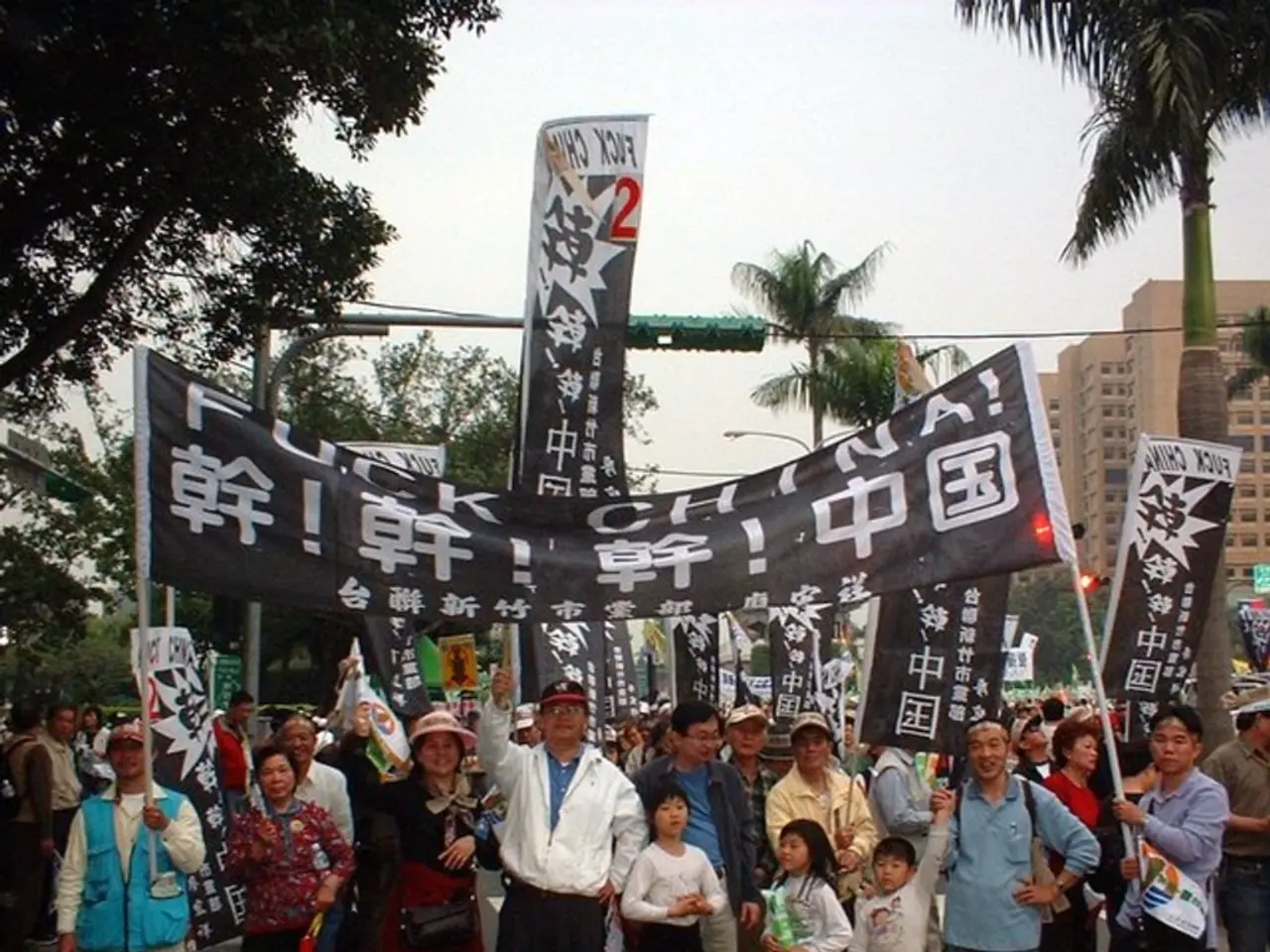Ensuring the Continuity of Human Kind: Integrate Women in Peace Negotiations
In the pursuit of lasting solutions to global conflicts, the importance of women's participation in peace processes has come to the forefront. According to recent data, women constitute a mere 9.6% of negotiators, 13.7% of mediators, and 26.6% of signatories to peace agreements worldwide in 2023, a figure that underscores the need for change [1].
To address this imbalance, countries are implementing National Action Plans (NAPs) in line with UN Security Council Resolution 1325. For instance, Palestine has developed successive NAPs to ensure women's full and meaningful participation [2]. Additionally, global initiatives and programmes, such as the Nobel Women's Initiative's Sister-to-Sister Young Feminist Leadership Program, equip young women with the necessary skills for peace negotiations and feminist leadership [3].
The United Nations Women's strategic plan also aims to tackle challenges in gender equality, including the lack of women in peace talks. However, UN data between 2020 and 2023 showed a significant absence of women in peace negotiations [4]. Civil society organisations and feminist forums are advocating for gender equality in international forums, such as the Financing for Development (FfD) conference, to ensure support for gender equality initiatives.
The benefits of including women in peace negotiations are manifold. Women bring diverse perspectives and experiences, leading to more inclusive and sustainable peace agreements [5]. Studies have shown that peace agreements with women’s participation have a higher chance of lasting longer and being more effective [6]. Moreover, their inclusion ensures that women's rights and interests are represented, which is crucial for achieving gender equality and empowering women [7].
Including women in peace negotiations can also enhance the legitimacy of peace processes by making them more representative of the population affected by conflict [8]. Furthermore, women's involvement in peace-building can lead to more durable peace by addressing the root causes of conflict and promoting social cohesion [9].
However, many peace processes lack strong monitoring systems to ensure agreements are followed, making it difficult to hold parties accountable and potentially leading to renewed conflict [10]. Independent organisations for monitoring peace agreements can enhance accountability and support long-term peace.
A more inclusive approach to rebuilding after conflict, with women's participation, fosters social cohesion [11]. Including more women in peace negotiations can lead to better outcomes and a higher number of provisions aimed at political reform [12]. Women's participation in peace processes can enhance community trust and cooperation [13].
Peace agreements without female participation may miss important issues such as family welfare, education, and healthcare, and have lower rates of implementation and longevity [14]. Incorporating diverse perspectives, including women's voices, leads to more holistic solutions in peace agreements [15]. Education and community engagement can promote gender equality and create a more inclusive environment for negotiations [16].
Peace processes should be adaptable to changing circumstances to facilitate constructive dialogue and agreements that work for all parties involved [17]. Challenging societal norms is crucial for increasing women's participation in peace processes [18]. Strengthening the foundation for peace by making peace processes more effective and representative benefits society as a whole [19].
In conclusion, boosting women's representation in peace negotiations is a significant step towards achieving more sustainable and equitable peace agreements. Global measures, such as policy frameworks, capacity-building programmes, and advocacy, are being implemented to enhance women's participation. The inclusion of women in peace processes not only benefits women but also contributes to long-term stability and societal progress as a whole.
References: [1] UN Women (2023). Women in Peace and Security. [online] Available at: https://www.unwomen.org/en/what-we-do/peace-and-security [2] Nobel Women's Initiative (n.d.). Sister-to-Sister Young Feminist Leadership Program. [online] Available at: https://nobelwomensinitiative.org/programs/sister-to-sister-young-feminist-leadership-program/ [3] UN Women (2023). Strategic Note 2020–2023. [online] Available at: https://www.unwomen.org/en/news/stories/2020/11/un-women-strategic-note-2020-2023 [4] UN Women (2023). Women's Participation in Peace Negotiations. [online] Available at: https://www.unwomen.org/en/what-we-do/peace-and-security/women-peace-and-security-agenda/women-in-peace-processes [5] United Nations (2015). Women, Peace and Security: A Progress Study. [online] Available at: https://www.un.org/womenwatch/osagi/wps/files/WPS_Progress_Study_2015_ENGLISH.pdf [6] World Bank (2011). Women's Participation in Peace Processes: A New Research Agenda. [online] Available at: https://openknowledge.worldbank.org/handle/10986/11074 [7] United Nations (2015). Women, Peace and Security: A Progress Study. [online] Available at: https://www.un.org/womenwatch/osagi/wps/files/WPS_Progress_Study_2015_ENGLISH.pdf [8] United Nations (2015). Women, Peace and Security: A Progress Study. [online] Available at: https://www.un.org/womenwatch/osagi/wps/files/WPS_Progress_Study_2015_ENGLISH.pdf [9] United Nations (2015). Women, Peace and Security: A Progress Study. [online] Available at: https://www.un.org/womenwatch/osagi/wps/files/WPS_Progress_Study_2015_ENGLISH.pdf [10] United Nations (2015). Women, Peace and Security: A Progress Study. [online] Available at: https://www.un.org/womenwatch/osagi/wps/files/WPS_Progress_Study_2015_ENGLISH.pdf [11] United Nations (2015). Women, Peace and Security: A Progress Study. [online] Available at: https://www.un.org/womenwatch/osagi/wps/files/WPS_Progress_Study_2015_ENGLISH.pdf [12] United Nations (2015). Women, Peace and Security: A Progress Study. [online] Available at: https://www.un.org/womenwatch/osagi/wps/files/WPS_Progress_Study_2015_ENGLISH.pdf [13] United Nations (2015). Women, Peace and Security: A Progress Study. [online] Available at: https://www.un.org/womenwatch/osagi/wps/files/WPS_Progress_Study_2015_ENGLISH.pdf [14] United Nations (2015). Women, Peace and Security: A Progress Study. [online] Available at: https://www.un.org/womenwatch/osagi/wps/files/WPS_Progress_Study_2015_ENGLISH.pdf [15] United Nations (2015). Women, Peace and Security: A Progress Study. [online] Available at: https://www.un.org/womenwatch/osagi/wps/files/WPS_Progress_Study_2015_ENGLISH.pdf [16] United Nations (2015). Women, Peace and Security: A Progress Study. [online] Available at: https://www.un.org/womenwatch/osagi/wps/files/WPS_Progress_Study_2015_ENGLISH.pdf [17] United Nations (2015). Women, Peace and Security: A Progress Study. [online] Available at: https://www.un.org/womenwatch/osagi/wps/files/WPS_Progress_Study_2015_ENGLISH.pdf [18] United Nations (2015). Women, Peace and Security: A Progress Study. [online] Available at: https://www.un.org/womenwatch/osagi/wps/files/WPS_Progress_Study_2015_ENGLISH.pdf [19] United Nations (2015). Women, Peace and Security: A Progress Study. [online] Available at: https://www.un.org/womenwatch/osagi/wps/files/WPS_Progress_Study_2015_ENGLISH.pdf
- Addressing the dearth of women in peace processes requires global initiatives such as the Nobel Women's Initiative's Sister-to-Sister Young Feminist Leadership Program, which empower young women to develop skills for peace negotiations and feminist leadership.
- The United Nations Women's strategic plan aims to address gender equality challenges, including the lack of women in peace talks, but data between 2020 and 2023 showed a significant absence of women in peace negotiations.
- Education and community engagement can promote gender equality, creating a more inclusive environment for peace negotiations, thus contributing to sustainable and equitable peace agreements.
- The benefits of including women in peace negotiations extend beyond gender equality, as their diverse perspectives and experiences lead to more inclusive, sustainable, and effective peace agreements.




